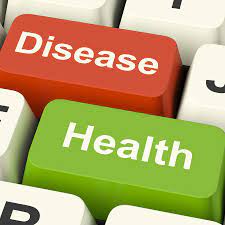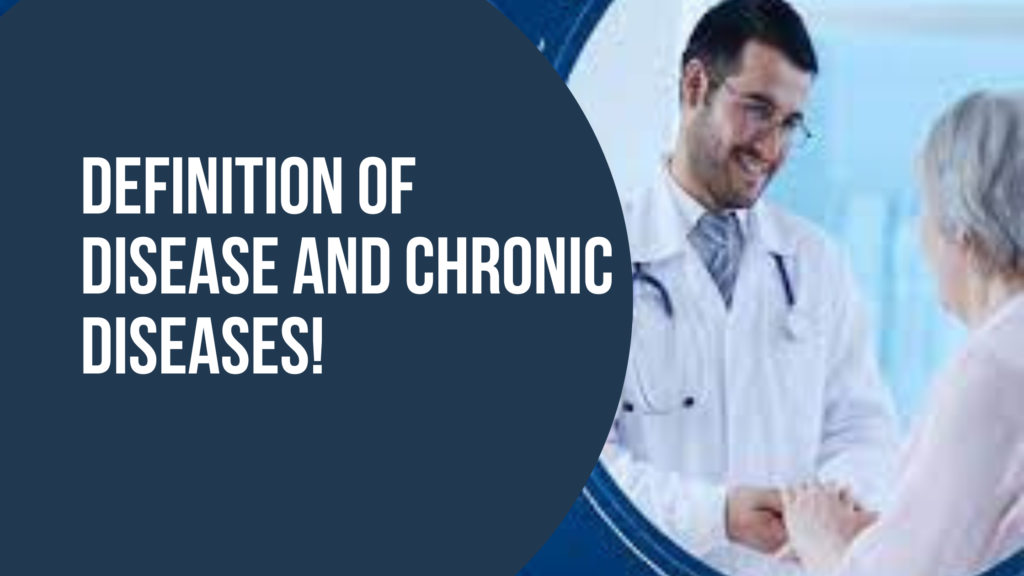Table of Contents
Introduction
What is a disease? What is a chronic disease? Learn about the different definition of disease and chronic diseases, and how they can affect your health.
In this blog article, you will learn about the following:
- The Definition of Disease: What is a Disease?
- Chronic Diseases: What are They and How Do They Affect You?
- The Different Types of Diseases: How Are They Defined?
- Understanding Diseases: What You Need to Know
- The Importance of Defining Disease: How It Can Help Your Health
—————————————————————————————————————
The Definition of Disease: What is a Disease?

According to Merriam-Webster dictionary a simple definition of disease is: “a condition of the living animal or plant body or of one of its parts that impairs normal functioning and is typically manifested by distinguishing signs and symptoms: sickness, malady. infectious diseases. a rare genetic disease. heart disease”
What is the definition of disease in biology? According to biologyonline a disease/s is an abnormal condition of an organism which interrupts the normal bodily functions that often leads to feelings of pain and weakness, and is usually associated with symptoms and signs.
A pathologic condition in which the normal functioning of an organism or body is impaired or disrupted resulting in extreme pain, dysfunction, distress, or death.
It may include state of injuries, disabilities, disorders, syndromes, infections, isolated symptoms, deviant behaviors, or atypical variations of structure and function. [ https://www.biologyonline.com/dictionary/disease]
According to Wikipedia a disease is “ The term disease broadly refers to any condition that impairs the normal functioning of the body. For this reason, diseases are associated with the dysfunction of the body’s normal homeostatic processes.
According to the dictionary.com, a disease is “a disordered or incorrectly functioning organ, part, structure, or system of the body resulting from the effect of genetic or developmental errors, infection, poisons, nutritional deficiency or imbalance, toxicity, or unfavorable environmental factors; illness; sickness; ailment.
According to the website byjus.com, what is disease? is defined as: “A disease is a condition that deteriorates the normal functioning of the cells, tissues, and organs.”
The disease can also be defined as:
“Any dangerous divergence from a functional or normal state of an entity.”
—————————————————————————————————————————-
Chronic Diseases: What Are They?
According to CDC chronic diseases are “Chronic diseases are defined broadly as conditions that last 1 year or more and require ongoing medical attention or limit activities of daily living or both.”
According to Wikipedia “A chronic condition (also known as chronic disease or chronic illness) is a health condition or disease that is persistent or otherwise long-lasting in its effects or a disease that comes with time. The term “chronic” is often applied when the course of the disease lasts for more than three months.”
——————————————————————————————————————–
What is the difference between a acute disease and chronic disease?
There is no single, universally accepted definition of disease. However, a disease can be broadly defined as any deviation from a state of optimal health. This can include both physical and mental health. Diseases can be caused by a variety of factors, including genetics, environment, and lifestyle.
Some common definitions of the disease include:
- A disorder of structure or function in a human, animal, or plant, especially one that produces specific symptoms or that affects a specific location and is not simply a symptom of another disease.
- A condition that affects the body or mind and either causes or predisposes one to medical problems.
- A particular abnormal condition that negatively affects the body or mind.
Chronic diseases are long-lasting conditions that can be mild or severe, and may or may not be progressive (meaning that it gets worse over time). Chronic diseases can affect many different parts of the body and can have a significant impact on a person’s life.
Some common chronic diseases include:
- Heart disease: Heart disease is a condition that affects the heart and blood vessels. It is the leading cause of death in the United States.
- Cancer: Cancer is a group of diseases involving abnormal cell growth with the potential to invade or spread to other parts of the body. The exact cause of cancer is not fully understood, but it is thought to be caused by a combination of genetic and environmental factors.
- Stroke: A stroke is a sudden interruption of blood flow to the brain that can cause permanent damage or death. Strokes are caused by a clot that blocks an artery in the brain or by a bleed in the brain.
- Diabetes: Diabetes is a chronic health condition that affects how your body turns food into energy. There are two main types of diabetes: type 1 and type 2. Type 1 diabetes is an autoimmune disease that causes the body to attack its own insulin-producing cells. Insulin is a hormone that helps the body use glucose for energy. Type 2 diabetes is caused by a combination of genetic and lifestyle factors, such as obesity and a sedentary lifestyle.
- Chronic obstructive pulmonary disease (COPD): COPD is a group of lung diseases that make it difficult to breathe. COPD is caused by a buildup of scar tissue in the lungs, which makes it harder for the lungs to expand and contract.
- Arthritis: Arthritis is a group of diseases that cause joint pain, stiffness, and swelling. There are many different types of arthritis, but the most common are osteoarthritis and rheumatoid arthritis. Osteoarthritis is caused by the breakdown of cartilage in the joints. Rheumatoid arthritis is an autoimmune disease that causes the body to attack its own joints.
——————————————————————————————————————————-
Why impaired functioning is not used in defining chronic diseases?
In defining a disease, the term impaired functioning of the cells is included whereas the term “impaired functioning of the cell or the body” is missing from chronic diseases.
This makes it difficult to do root cause analysis of diseases.
In any disease, the functioning of certain cells is affected. The reasons could be varied. There is a direct relationship between cellular function and chronic diseases.
What keeps us healthy?
Food provides essential nutrients to the body. These nutrients are in turn used for energy, cell growth, and repair. Food keeps the immune system happy and, as a result, poor diets often lead to numerous health problems. Food can be broken down into four essential groups: fats, carbohydrates, protein, and vitamins.
What is a functioning cell?
References
How cells obtain energy https://www.ncbi.nlm.nih.gov/books/NBK26882/
Use Your Words Carefully: What Is a Chronic Disease? https://www.ncbi.nlm.nih.gov/pmc/articles/PMC4969287/
Chronic disease https://www.aihw.gov.au/reports-data/health-conditions-disability-deaths/chronic-disease/overview
Chronic conditions https://en.wikipedia.org/wiki/Chronic_condition
Noncommunicable diseases https://www.who.int/health-topics/noncommunicable-diseases#tab=tab_1
Health and disease as practical concepts: exploring function in context-specific definitions
https://www.ncbi.nlm.nih.gov/pmc/articles/PMC8857121/
11 Amazing Things The Body Does To Keep Us Alive https://youmustgethealthy.com/10-amazing-things-body-those-to-keep-us/

